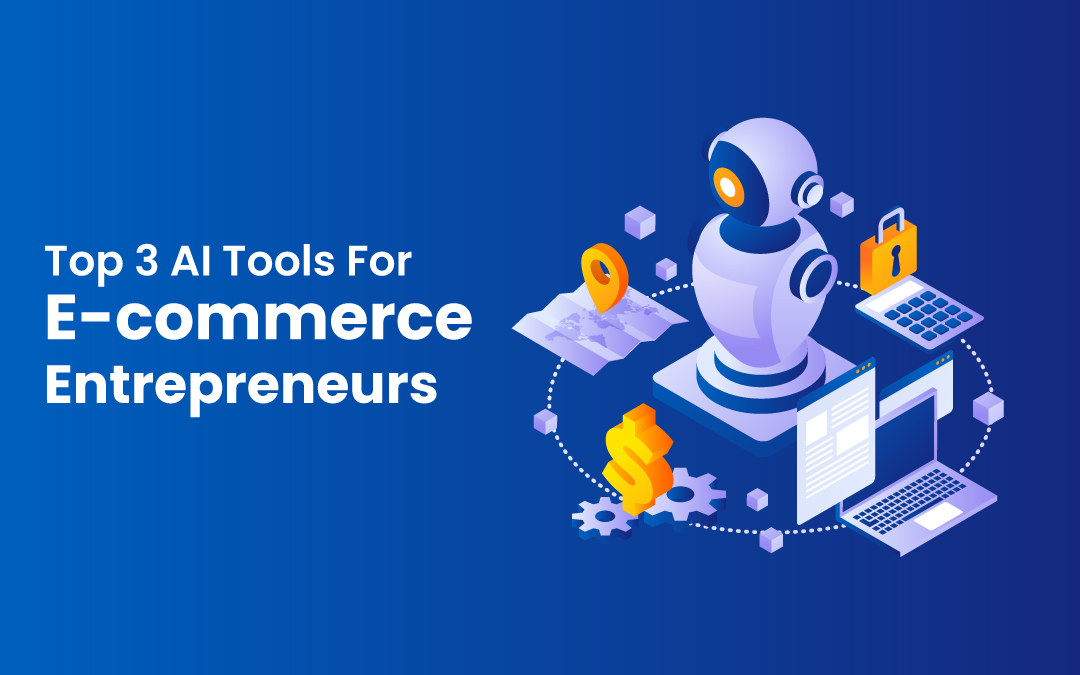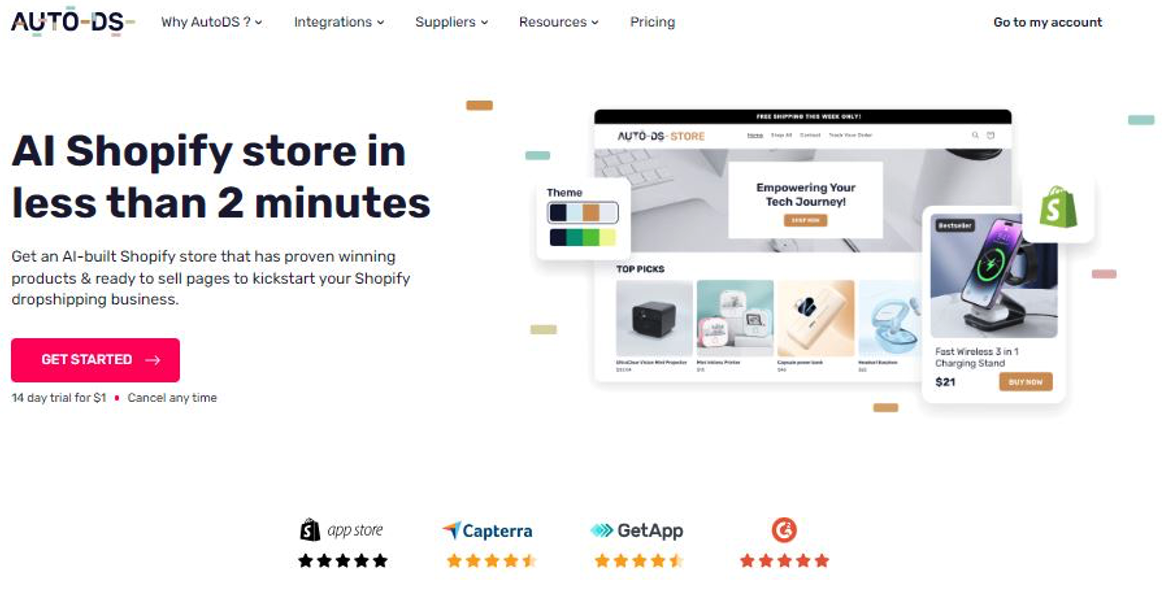
If you don’t know the benefits of artificial intelligence by now, you’re missing out on something that could revolutionize your work. The web is growing, creating opportunities and offering new resources for those who adapt to the speed at which the world is moving. Staying on the sidelines is not an option!
We know that working in e-commerce often requires constant study of new market trends and updates that create new niches for buying, selling, and promoting your products. Combined with all the tasks involved in running a business, this can become tedious and exhausting. AI tools are here to help us! Let's review some resources that will add practicality to your daily routine, allowing you to save time and reduce unnecessary costs.
What Are AI Tools And Are They Worth It?

AI tools use artificial intelligence to perform tasks that generally require human skills and intelligence. These tasks include understanding specific languages, recognizing patterns, making various decisions, and organizing according to criteria.
Artificial intelligence has developed remarkably in recent years, allowing its application across various fields. These software programs can now write, compose music, design websites, operate vehicles, and more. In the world of e-commerce, consider how valuable they can be in helping us automate specific tasks that would otherwise take more time if done manually.
Of course, the value of these applications or programs depends on how we use them. When utilized effectively, they can directly contribute to our business's growth and our sales. We’re not talking about magical resources that will do everything for us overnight, but rather precious tools that we need to take the time to study and make the most of!
Artificial intelligence technologies can improve the shopping experience. According to Statista, one-third of consumers thought generative AI tools could provide more timely responses to their requests. At the same time, another 15 percent of them mentioned the accuracy and higher quality of generative AI responses. Let's look at some other benefits that these resources provide.
Time and Cost Savings
AI tools can significantly reduce the time spent on repetitive and time-consuming tasks, such as data entry and customer inquiries. By automating these processes, we can operate more efficiently, freeing up valuable time to focus on more strategic activities. This automation also saves substantial costs, as fewer resources are needed to complete tasks that would require considerable human labor.
Improved Efficiency
These resources enhance efficiency by streamlining workflows and optimizing processes. For instance, AI can quickly analyze vast amounts of data to provide actionable insights, automate inventory management, and manage customer interactions with minimal human intervention. This increased efficiency speeds up operations and ensures that resources are used more effectively, leading to smoother and more productive business operations.
Enhanced Accuracy
Artificial Intelligence tools excel in tasks requiring high precision and consistency levels. For example, machine learning algorithms can detect patterns and anomalies in data more accurately than humans, reducing errors in tasks such as financial forecasting or customer segmentation. This enhanced accuracy minimizes the risk of costly mistakes and helps us make more informed and reliable decisions.
Adaptability
These tools are highly adaptable, and we can tailor them to meet the specific needs of different business sectors and changing market conditions. They can learn from new data and adjust their functions accordingly, making them versatile solutions for evolving challenges. This adaptability allows us to remain competitive and quickly respond to new opportunities or shifts in the market.
Types Of AI Tools

The type of digital tool we use will depend on the task we need to solve and our personal preferences. Many of these tools help us avoid hiring an expensive professional or acquiring extensive knowledge and experience in a specific process. Here are some of the main types of digital tools:
Generative Tools
We can use these AI tools to create content, such as text or images, based on the information we provide as users. ChatGPT and DALL-E are excellent examples, as they can generate written content and conversational responses and assist with various writing tasks like corrections, translations, coding, etc.
We can leverage these tools to create different types of content, such as blog posts, marketing copy, and social media graphics. Generative tools also facilitate design by generating visual concepts, streamlining creative processes, and enhancing productivity.
Automation Tools
If you are a business person or an entrepreneur, these AI tools can be a game-changer for your routine. We can leverage automation tools to automate processes that are generally repetitive and time-consuming. Platforms like AutoDS, for example, automate inventory management, order processing, price adjustments, and other tasks, minimizing the manual effort required to manage an online store.
Other tools like Zapier or Integromat integrate various applications to improve workflow, automate customer support, and synchronize information across different platforms. Automating these tasks can save you time, allowing you to focus on the more demanding aspects of your business and drive its growth.
Design Tools
Design tools like Canva Pro use AI to simplify and accelerate the graphic design process. Features such as background removal, automated design suggestions, and template customization help us create high-quality visuals. These tools can quickly generate design elements, suggest color schemes, and adapt templates to fit our specific branding needs. This functionality enables us to produce professional-looking graphics efficiently without requiring extensive design skills or software expertise.
Transcription Tools
Transcription tools, such as Otter.ai automate the conversion of spoken content into written text. These tools are handy for transcribing meetings, lectures, and interviews, allowing us to capture and organize verbal information quickly. Compared to manual transcription, which is labor-intensive and time-consuming, this type of software can deliver accurate transcripts in a fraction of the time. This efficiency saves us significant time and improves accessibility and documentation of spoken content, facilitating more accessible review and reference.
Top 3 AI Tools for E-commerce Entrepreneurs
Now that we’ve reviewed some of the benefits and types of AI tools, you might wonder which best suits your situation! The artificial intelligence market is filled with software that can help you, so let’s look at three of the best options to make an informed choice!
AI Shopify Store Builder

Building an online store is one of the first steps for almost any business. It’s the platform where you’ll showcase your products, market them, and attract your ideal audience. Today, Shopify is one of the best-selling channels for business models like dropshipping. But how easy is it to build your online store there?
You can do it manually if you have the time and knowledge about design, copywriting, and everything involved in setting up an online store from scratch. Another option is to hire a professional through sites like Fiverr to handle these tasks for you. However, if you want a practical solution and to move forward with building your business, artificial intelligence can help you set up a store in just two minutes.
Using an AI Shopify Store Builder can save you a lot of headaches, time, and money. In just a few minutes, you can have a fully functional store up and running with everything you need.
Key Features
- Automated store setup
- Customizable design templates
- AI-driven product recommendations
- Inventory management integration
- Responsive design optimization
Looka For Logo Design

As is well known, presentation is everything. A brand, a business, or a product all need their corresponding branding, including their distinctive color and typography—essentially, a matching identity. This can be more challenging to achieve for those of us who don’t have an artistic flair. Of course, we can try to learn to design ourselves or seek out designers, but that also requires time and additional expenses, which may be challenging to manage in the early stages of our business.
Artificial intelligence offers significant help with these issues through software like Looka, a platform focused on creating logos, brand identities, and other visual assets. It leverages artificial intelligence to simplify and automate the design process, making it accessible even to those with no background in design.
Key Features
- AI-generated logo designs
- Brand identity creation
- Customizable design elements
- Downloadable logo files
- Design suggestions based on user input
ChatGPT

ChatGPT is an AI language model that can understand and generate human-like text based on our input. Essentially, it’s like having an advanced virtual assistant that can help with a wide variety of tasks.
We can use this tool in many useful ways: the first is for generating content such as product descriptions, social media updates, marketing copy, etc. For example, ChatGPT can be a huge help for eBay dropshipping when optimizing product titles and descriptions, saving you time and effort.
Additionally, it can help enhance our customer service by creating automated responses, assisting with SEO content, conducting market research, or aiding in product development.
Key Features
- Text generation
- Content creation (e.g., blog posts, product descriptions)
- Automated customer support responses
- Market research assistance
- SEO content optimization
 FAQs
FAQs
No, AI cannot handle every aspect of your e-commerce store, but it can significantly assist with many tasks. While it automates repetitive processes, generates content, and analyzes data, human oversight and strategic decision-making are still essential for customer relationships, complex problem-solving, and creative direction.
Yes, AI tools can benefit us by streamlining operations, improving efficiency, and reducing manual workloads. AI can assist with tasks like content creation, customer support, and data analysis, allowing you to focus on strategic growth and innovation. However, choosing tools that align with your business needs and integrate well with your existing processes is important.
When incorporating AI tools into your e-commerce business, consider which tasks and processes can benefit from automation to enhance efficiency and productivity. Evaluate the cost-benefit ratio to ensure that the investment in AI tools provides a justified return. Provide adequate training and support for your team to utilize these tools effectively. Data privacy and security should also be prioritized to protect sensitive information and comply with regulations.
Conclusion
The future is just around the corner, and if we are in business and want to continue increasing our sales and customers, we must adapt to technological changes and the opportunities that technological advancements offer. AI tools cannot replace our work, but they are excellent allies for automating time-consuming and costly processes, allowing us to focus on what matters most.
Inventory management, customer service, website development, brand design—the list of tasks that can be automated is extensive. Choosing the right tool depends mainly on our judgment and what we consider best for our store. Still, undoubtedly, with some of the software we discussed above, you can take a significant step forward in your journey as an entrepreneur.
Share this post
Leave a comment
All comments are moderated. Spammy and bot submitted comments are deleted. Please submit the comments that are helpful to others, and we'll approve your comments. A comment that includes outbound link will only be approved if the content is relevant to the topic, and has some value to our readers.




Comments (0)
No comment